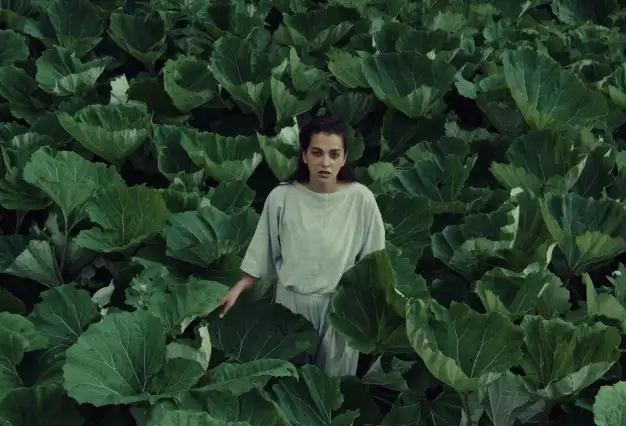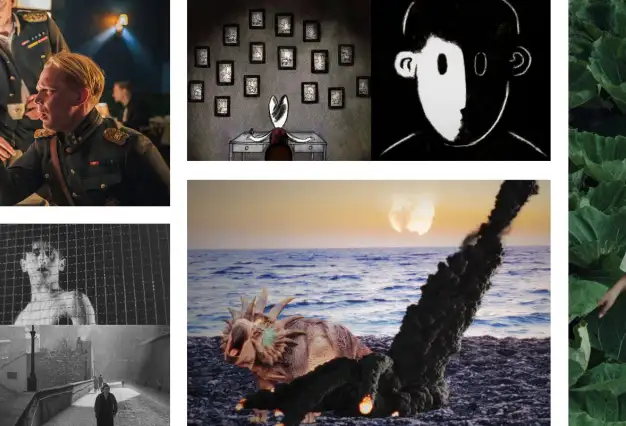
09 September 2025
From documentary roots to fiction frontiers
Barbora Chalupová & Greta Stocklassa
From documentary roots to fiction frontiers
Barbora Chalupová & Greta Stocklassa

Filmmakers Barbora Chalupová and Greta Stocklassa embody two converging trajectories in the latest wave of Czech cinema, moving fluidly between documentary and fiction to interrogate the shifting boundaries between the personal and the political. Chalupová’s work merges activism with cinematic inquiry, charting the intimate negotiations of identity and agency within broader structures of power, while Stocklassa’s precise, observational style probes trust, responsibility, and the systems that shape human lives. Both directors extend their documentary sensibilities into fiction in upcoming projects.
by Martin Kudláč for CZECH FILM / Fall 2025
Barbora Chalupová: The politics of intimacy and power
Barbora Chalupová belongs to the young generation of Czech filmmakers whose work consistently investigates the dynamics and tension between personal agency and institutional control, often through gender, sexuality, and ideological resistance. Her works, rooted in nonfiction yet increasingly extending into fiction, extend across activism and psychological inquiry. Whether mapping the intimate contours of identity in the shadow of social norms or exposing the mechanics of power, Chalupová moves fluidly between observational realism, investigative urgency, and formal experimentation. Her films are marked by a clear ethical stance and an enduring commitment to amplifying marginalized voices, while her recent expansion into fiction filmmaking reflects a broader artistic strategy to rethink traditional power structures not only through documentation, but also storytelling.
Her early works, including Transition (2014), Arms Ready (2016), and A Theory of Equality (2017), examined personal freedom under structural constraint. The latter, produced for Czech Television’s Czech Journal docuseries, applied a structuralist lens to the topic of gender parity, probing ideological resistance and the mechanisms of media framing. A more experimental direction emerged in On the Edge (2018), which portrayed Czech Flat Earthers whose fringe view reflects their broader anxieties. In Real (E)state (2019), another episode for Czech Journal, Chalupová turned her camera to the housing crisis.
Her breakthrough came with an exposé of online predators and child grooming Caught in the Net (2020), which she codirected with Vít Klusák. The film became the most-watched documentary in the history of Czech cinema, beating out U.S. imports and local mainstream fare alike at the box office domestically. Its impact extended far beyond numbers, too: the film triggered national debates, policy reform, and inspired grassroots movements against digital abuse. Chalupová’s follow-up feature, The Law of Love (2021), was a documentary focused on the grassroots campaign for marriage equality in the Czech Republic, presenting intimate portraits of LGBTQ+ activists and families within the larger political context.
Chalupová’s most recent documentary, Virtual Girlfriends, dives into the subcultural landscape of OnlyFans, mapping the emotional economy of online intimacy. Conducted with the same ethical care and transparency as her previous works, the film questions how digital platforms reconfigure desire, power, and connection in an era increasingly mediated by screens. Rather than rely on expert commentary or conventional interviews, Chalupová adopts a cinéma vérité approach, following three young women dealing with performance and commodified intimacy in the fast-growing online industry. Avoiding the moral binaries typically applied to sex work, Virtual Girlfriends reframes the conversation through themes of fair-trade labor, voluntary participation, and the psychological ambiguities of transactional relationships. The film has been completed and is expected to premiere on the international festival circuit in late 2025.
Despite being mainly associated with documentary filmmaking, Chalupová has been working on her fiction feature debut, Electric Wonder, for several years. A historical adventure aimed at children and their parents, the film draws inspiration from the life and inventions of 18th-century Czech pioneer Prokop Diviš, whose work on lightning conductors and electrotherapy was dismissed by his contemporaries. The project has already received script and production support from the Czech Audiovisual Fund and won the top award at the Film Foundation’s “Star of Tomorrow” script competition. The director cowrote the script with her brother, screenwriter Marek Chalupa, and has developed the project with international script consultant Philip LaZebnik (Pocahontas, Mulan). Electric Wonder is a Czech-Polish-Austrian coproduction, led by Czech producer Pavla Klimešová of Helium Films, the company that was also behind Virtual Girlfriends, Caught in the Net, and The Law of Love.
Simultaneously, Chalupová is also working on her sophomore fiction feature, Turquoise Mountain, based on real-life mountaineer Dina Štěrbová, the first woman to climb Cho Oyu, on the China-Nepal border, in the 1980s. The film tackles female ambition, resistance to gendered expectations, and the solitary determination to conquer physical and social peaks. The Czech-Slovak-Italian coproduction, led by Czech producer Julie Marková Žáčková of NOCHI FILM, will combine alpine location shoots with studio work to recreate the psychological and environmental challenges of Himalayan climbing. Anita Krausová, herself an experienced ski mountaineer, is cast in the lead role.
Alongside her feature work, Chalupová remains engaged in episodic storytelling. She is currently attached to a six-part docudrama on Czech army reservists, commissioned by Czech-Slovak VOD platform One Play (formerly known as Voyo) and produced by Karolína Zalabáková’s Ciné BonBon. She is also developing several new documentary projects, including a long-term time-lapse exploration of over-tourism in UNESCO-protected villages, under the working title Viewpoint.
Chalupová’s transition into fiction does not mark a departure from her documentary ethos, but rather an extension of it. Her fiction projects retain a core commitment to exploring power structures, social resistance, and underrepresented perspectives as she continues to examine how personal conviction operates within systemic confines.
Greta Stocklassa: The politics of the personal
Czech-Swedish filmmaker Greta Stocklassa moves between documentary and fiction, often focusing on questions of power, trust, and collective responsibility. A graduate of the documentary directing program at FAMU, she combines observational techniques with formal precision to examine how political and social structures shape individual lives. Her films engage with contemporary themes such as institutional transparency, environmental risk, and generational divides, reflecting a consistent interest in the tension between public systems and private experience.
Her internationally acclaimed feature documentary debut, Kiruna – A Brand New World (2019), introduced Stocklassa’s auteur voice. Set in Sweden’s northernmost town, the film chronicles the surreal process of relocating an entire city due to mining operations. Stocklassa captures a community suspended between modernity’s promise and the existential disquiet of displacement. The documentary premiered in the main competition at Visions du Réel and later screened at Ji.hlava and numerous international festivals, earning accolades including Best Documentary Screenplay at Arctic Open and the Student Jury Prize at Finále Plzeň.
Stocklassa’s short films reveal a poetic and introspective voice, often exploring themes of identity, absence, and emotional distance. From the minimalist experimental Medium Grey (2015) to the transcontinental family portrait Mum and Emma. Emma and Mum (2014), her early works examine the fragility of human connection. The Still Life of Věra (2015) is constructed from decades of anonymous postcards, animating a forgotten life through fragments of memory and correspondence. Employing elliptical narrative structures and stylized visuals, Stocklassa’s shorts blur the divide between documentary realism and poetic reconstruction.
The director continued this approach in her provocative docuessay Blix Not Bombs (2023), a portrayal of Hans Blix, the former UN weapons inspector. Framed as an intergenerational dialogue, the film juxtaposes Blix’s personal reflections on the lead-up to the Iraq War with the director’s contemporary anxieties, exploring the legacy of geopolitical decisions across time. Premiering to critical acclaim, it was nominated for the Czech Lion for Best Documentary and the Cinema for Peace Award 2024, while securing theatrical distribution in Sweden, Germany, and France.
Stocklassa’s latest work, the 29-minute Buzz of the Earth (2024), which won the Czech Lion for Best Short Film, is a sharply observed satirical short about a dispute within the European Space Agency on how best to draft a message to alien civilizations. As representatives of clashing worldviews debate what humanity should say to the universe, the film traces the deepening polarization of contemporary society across generations, ideologies, and even within families.
While Stocklassa’s works commonly blur the line between documentary and fiction, after Buzz of the Earth, her feature-length fiction debut, Burnout, slated for 2027, marks her biggest pivot yet to fiction filmmaking. The film is a loose adaptation of the eponymous novel by writer Petr Šesták, which was nominated for a Magnesia Litera Award, the Czech Republic’s most prestigious literary honors. Kryštof is a bicycle food courier in his late thirties, scraping by on the margins of a divided city. When a fleeting romance with an activist art student exposes the performative side of protest, he’s drawn deeper into radical resistance led by those for whom change is no longer merely a slogan but a necessity. As the line between activism and violence blurs, Burnout confronts the moral cost of survival in a world where justice feels out of reach. Currently in development at the Czech production company Xova Film and seeking coproducers and financing.
In parallel, Stocklassa is working on a documentary titled Between a Rock and a Hard Place, a time-lapse chronicle of the search for a geological repository for high-level nuclear waste in the Czech Republic. Set against the backdrop of the EU’s reclassification of nuclear energy as sustainable, the film follows the Radioactive Waste Repository Authority, a Czech state agency, as it navigates public opposition, political pressure, and bureaucratic inertia. Juxtaposing national debates with international approaches, Between a Rock and a Hard Place will delve into the social fractures of populism and institutional distrust, as well as the fragility of democratic decision-making. The Czech Audiovisual Fund supported the project, which is being developed at the young Czech production outfit Beginner’s Mind.
Beyond her filmmaking work, Stocklassa occasionally serves as a dramaturg on other documentary projects, while also preparing to lead a directing workshop at FAMU. Looking forward, Stocklassa has expressed an interest in revisiting Buzz of the Earth to reimagine it as a stage production.
Related news
Related people
Barbora Chalupová
Sound
Greta Stocklassa
Director, Writer, Story, Editor






